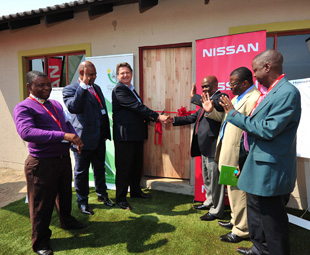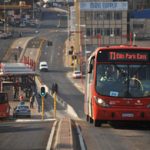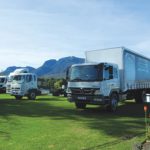Home is where the heart is

“I’m so happy I don’t know what to say, I’d given up on having my own house. If not for Nissan I’d still be suffering now.” With these simple words, Mostapha Mahomed sums up Nissan’s Blue Citizenship global housing initiative aimed at uplifting and empowering communities.
For the South African part of this project, Nissan (in partnership with the Tshwane Metropolitan Municipality and Habitat for Humanity SA) will provide housing to beneficiaries in Zone 10, a new area of Ga-Rankuwa, north of Pretoria.
“This project is close to the hearts of all of us at Nissan SA,” says managing director Mike Whitfield, “and it is with pride and humility that we look forward to participating in the transformation of so many people’s lives.”
And it is with a lot of heart that the company is undertaking this project as the funding isn’t tax deductable but forms part of Nissan SA’s CSR philanthropy programme – one of the pillars of Nissan’s Blue Citizenship strategy (centred on mobility, community and sustainability). Mahomed, turned down six years ago when he first applied for a house, is one of 200 beneficiaries identified by the Tshwane Metropolitan Municipality from its indigent register. Coincidentally, he’s a former Nissan employee who covered car seats for 15 years.
Sadly, Mahomed has been out of work since suffering a stroke 19 years ago, which resulted in him being partially paralysed and confined to a wheelchair. His house will be constructed to meet his disability challenges. Excited at the prospect of his own home, he says: “I’m looking forward to being independent again.” The project will be situated in a new area consisting of 1 200 stands provided by the municipality. Sites for schools, community facilities and parks have already been pinpointed. To fast track the project, the municipality has accelerated infrastructure support and exempted Nissan from building control registration fees.
The first phase of the project will see 50 houses built by the end of this year. Each 40 m2 unit is designed to accommodate a family of four, contains ceilings throughout and will be plastered and painted before occupation. Habitat for Humanity’s engineer will oversee construction, which will be undertaken by companies from the local area. It’s estimated that each house will cost in the region of R108 000 to build. To qualify as beneficiaries on the municipality’s indigent register, applicants have to be South African citizens who have never previously owned a house and whose total household income is R3 500 or less. Special cases include the elderly, child-headed households, people with disabilities and military veterans who meet the criteria.
Published by
Focus on Transport
focusmagsa




